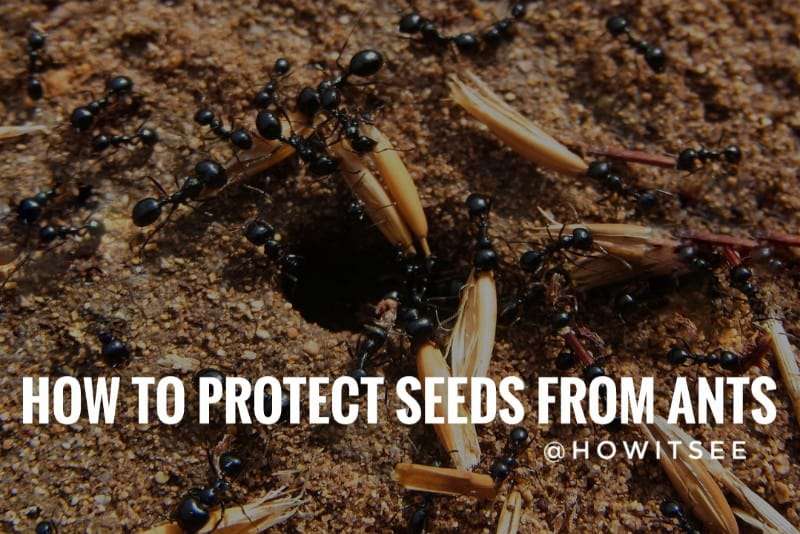Seeds have been serving various human purposes since time immemorial. Their nutritional and agricultural value is immense in today’s life. Seeds and sprouts serve as rich sources of proteins and are packed with multiple minerals and vitamins.
Seeds and their properties have been sustaining the ever-growing human population, even in those days and areas where agriculture is practically impossible.
With the growing trend of gardening and homegrown vegetables, it has become essential on parallel terms to protect the sowed seeds from “seed predators” such as ants and other insects. Taking care of the seeds is equally important as caring for the young emerged plants.
Therefore, in today’s article, we will bring before you some highly effective ways of keeping these six-legged creatures away from your seeds. So, without much ado, let us jump on to our article, “Ways to Protect Seeds from Ants or other insects.”
1) Add Vinegar and Water
Vinegar is an excellent ant repellant and can be used both outdoors and indoors. It is harmless, cheap, and effectively solves the ant menace. We have all seen ants moving around in long queues. Have you ever wondered how they manage to follow and communicate with each other?
Well, this is done with the help of pheromones. These are certain chemical substances released into the environment that can bring about behavioral changes in other species members.
Vinegar interferes with the functioning of these pheromones, and instead of marching towards the food, they will start moving haphazardly. The unbearable smell of vinegar will help keep away the ants and keep your seeds protected.
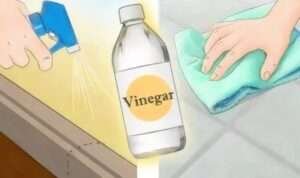
How to do:
- First, we need to prepare a solution containing equal portions of vinegar (primarily white vinegar) and water.
- Transfer the solution to a spraying bottle and apply it to the vulnerable areas.
- This treatment will keep the ants away from your seed for a couple of days.
- In case of severe infestation, the use of Apple Cider Vinegar instead of normal White Vinegar is advised.
- For best results, spray around at least twice or a maximum of thrice a week.
Precaution:
Do not spray in excess, as it may acidify the soil, which might not be preferred for seed germination and healthy plant growth. Spray around the sowed area and not directly above.
2) Cinnamon Powder or Cinnamon Oil
Did you know cinnamon serves to be an excellent ant repellent, apart from giving the finger-licking taste to your foods? The distinct smell and flavor of cinnamon are imparted by a compound called Cinnamaldehyde. This is an aromatic compound with a sharp smell.
Ants are communal insects and rely greatly on their sense of smell. The presence of such strong-smelling compounds suffocates the ants to a certain extent and helps to keep them away.
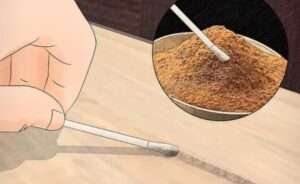
How to do:
- A normal sprinkle of grounded cinnamon would do the job.
- Sprinkle them around the seed to form a circle, preventing ants and other insects from coming in.
- For a more effective remedy, Cinnamon oil can be used. However, you need to remember that cinnamon oil is multiple times stronger than its grounded form. So, the best use is by diluting it by 99%. For excessive infestation, a stronger concentration of the oil is advised.
- Spray it around the sowed seed for a prolonged effect.
3) Baking Soda and Grounded Sugar
Baking Soda is another highly effective to repel insects, especially ants. Baking Soda and Sugar in their grounded form have a strikingly similar appearance.
The grounded sugar is to act as bait to lure the ants, which ingests the baking soda, too, along with the sugar. Baking soda is nothing but Sodium Bicarbonate.
This method is lethal to ants, as Baking Soda reacts with the acid produced in their stomach and causes plasmolysis of their gut cells, eventually exterminating them.
Using Baking Soda along with powdered sugar is undoubtedly the cheapest and one of the most effective ways to keep ants away from the seeds.
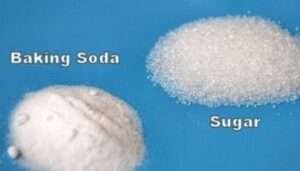
How to do:
- Ground powdered sugar and mix baking soda into it.
- Mix them thoroughly and sprinkle them around the seed like a boundary.
4) Lemon
Another cheap ant repellants are lemons. Lemons are citrus fruits and are rich in citric acid. They are good ant repellants and function in a manner similar to Vinegar and Cinnamon. The scent of lemons interferes with the ant’s sense of smell, causing it to lose its trail.
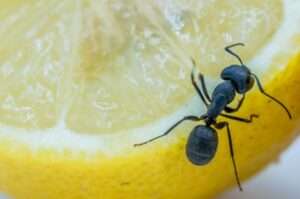
How to do:
- Squeeze out the lemon, and add the juice extracted to the water in a ratio of 1:3.
- Mix the solution well.
- Pour it into a sprayer.
- Now, you can spread it around the seeds in the soil to prevent ant infestations.
Precautions:
Be careful with the quantity, as these are acids and can alter the pH of the soil. Every plant species and seeds prefer a particular pH for germination and growth.
5) Borax
A commonly found household product primarily used for cleaning purposes, Borax can be extremely lethal to ants. It is naturally occurring and does not constitute any synthetic products.
Borax functions in a way much similar to Baking Soda. Ingestion of Borax directly affects the digestive system of ants and is therefore considered lethal.
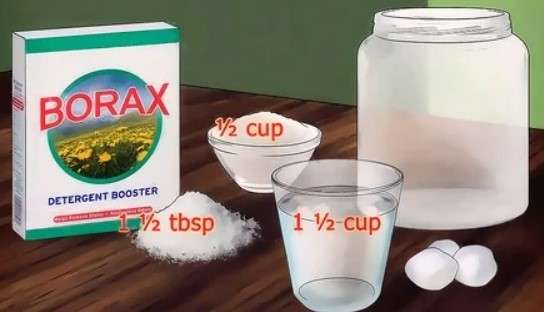
How to do:
- Mix equal proportions of powdered sugar and Borax.
- Sprinkle them around to keep the ants away.
6) Grounded peppermint or oil
Peppermint is an excellent insect repellant. Its natural properties help to keep off ants, mosquitoes, and other bugs. Peppermints possess a strong aroma, and ants generally stay away from such strong aromatic substances.
Studies have shown that ants won’t cross a line if it has been drawn with peppermint oil. Powdered peppermint helps too, but it is advisable to use peppermint oil for better effectiveness.
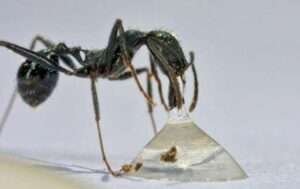
Credits: Andrea @ Flickr
How to do:
There are multiple ways of using peppermint as a repellant.
- Add around 20 drops of peppermint oil to approx. Two cups of water.
- Spray this solution using a misting bottle or sprayer around the sowed area to deter ants away.
- Another effective method is to soak a cotton ball into the solution and put them around.
- But with this method, the solution must be a concentrated version of the previous one.
Precaution:
Peppermint oil can be harmful if ingested by pets. Therefore, make sure to keep it out of their reach. If you have pets at home that spend a considerable time in the garden, then spraying can be a better option.
How to Stop Ants from Nesting in Plant Pots?
Ants are food-gathering insects. They do not ingest on the spot but cut it into bits and bring it back to their nest for storage and future use. An ant’s nest is located in a place keeping in view two major factors:
- Food
- Shelter
The soil in the plant pots provides an adequate shelter to these tiny three-legged creatures. Now, coming to food, often potted plants species of plants produce an excretion called honeydew. This sweet-smelling substance attracts the ants.
If the plant is a fruiting type, then it automatically becomes a foraging ground for ants and other insects. The soil is not the only abode for ants, as multiple other tiny creatures, smaller bugs, aphids, etc., take their shelter here. These tiny insects are often hunted by the horde of ants, making it a nutritionally rich place to live in.
So, how to keep these ants away and keep your plant protected?
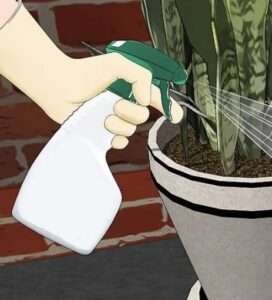
Credits: Wikihow
Steps:
- To deter ants from your plant pots, you can blindly follow the methods mentioned above.
- A sharp spray of water can be a mechanical way to remove them if they are infesting the leaves. However, this method does not affect the colony in the soil below, making it quite an ineffective method.
- Ways like spraying the pot with vinegar, cinnamon oil, or even baking soda or borax can prove a better way to keep these pests away.
- Introducing natural predators like ladybugs may sometimes be effective, but it may take quite a long time to bring in changes.
- Warding off plant pests like aphids, which are primary attractors, may save your plant pots to a lot extent.
Note- Vinegar is highly acidic, so this would change the pH of your soil and could degrade your soil and plant.
Despite the damage caused by ants, we cannot deny their role in gardening. Ant colonies and their movement up and down the soil, creating tunnels, help in the aeration of the soil, which directly helps the roots.
When ants perish, they add organic matter to the soil, which is then taken up by the plant for its growth and development.
To sum up, in this article, we have mentioned repellants as well lethal ways to deal with the increasing ant menace. There can be two ways to deal with it: in a humane manner, by simply repelling them off, or by using ways that can eliminate the entire colony.
Keeping our selfish reasons aside, we also need to look at the ecological significance of ants and their role in the garden and take steps accordingly. Here, we conclude our article. We will be bringing more informative articles in the coming days, so stay tuned.
References
Image Source- Wikihow, Corbyn Facts, Hoc Wiki
Also Read:

Meet Abhidept (nickname Monty), the visionary founder of How It See, being an engineering student, he’s fueled by an insatiable curiosity about the world around him. He is captivated by an eclectic correlation between animal groups, science, and nature, and this fascination drives his quest for understanding.
After completing his degree, he’s set on a mission to delve deep into the realm of nature, accumulating knowledge to share with you through his writing. In the meantime, he loves to watch anime and read anime.
